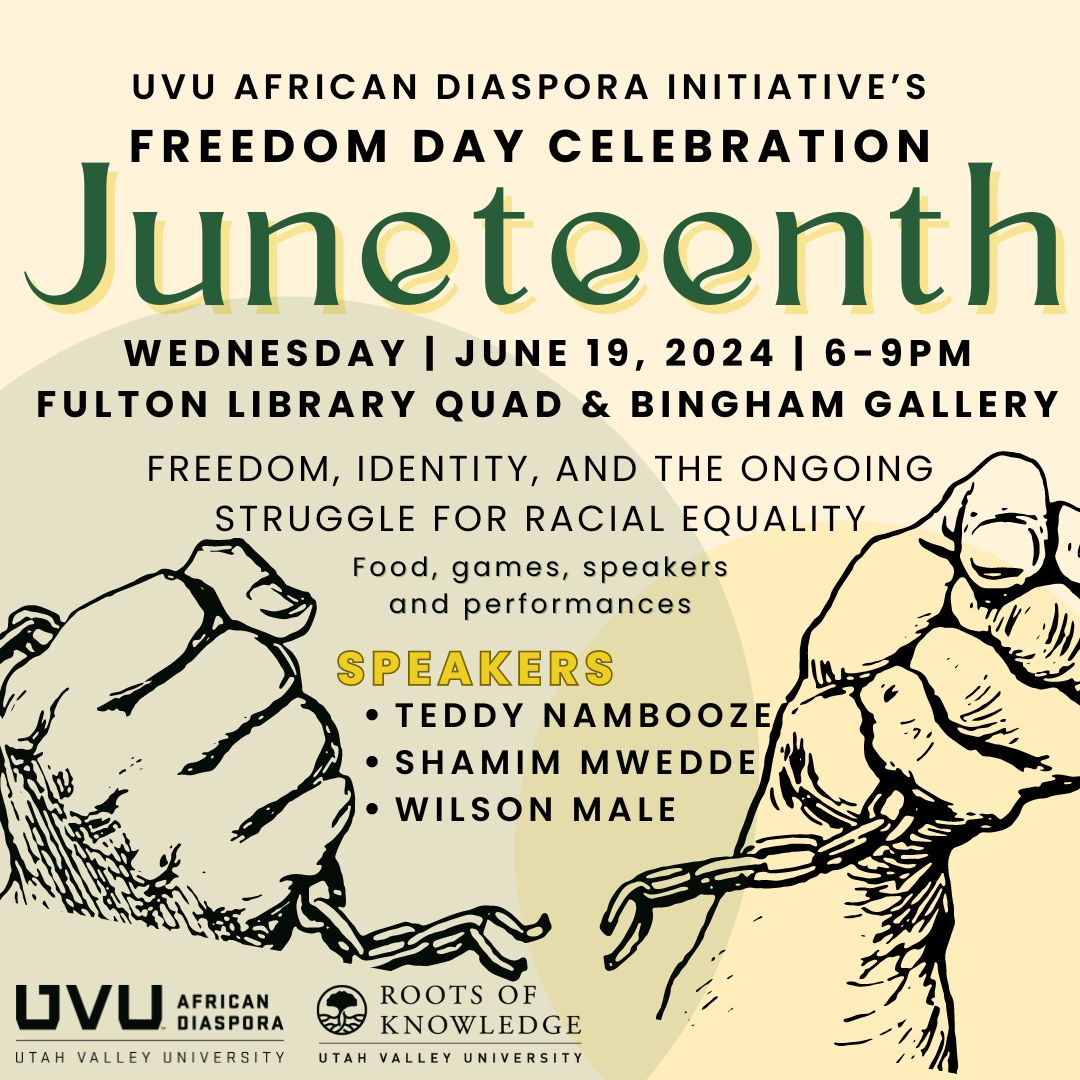
Juneteenth celebrates the end of slavery in the United States. It is also known as Emancipation Day, Freedom Day, Jubilee Day, Juneteenth Independence Day, and Black Independence Day. At UVU we celebrate the event as a commemoration of the end of slavery. Come to learn and connect with community through food, games, local performers, artists, and speakers!

Every time I visit Roots of Knowledge, I’m overwhelmed by the light of the room—how it interacts with the panels and fills the space. As a physicist who works in biophotonics, my mind instantly goes to light-matter interactions. This talk will begin with a brief introduction to light-matter interactions and how they play a part in Roots of Knowledge. But any discussion of light opens the door to countless critical concepts in human understanding; I’ll focus on two such topics. The first will touch on how light directly informs human knowledge on both the local and universal scales. The discussion will then evolve along more esoteric lines, with an introduction to one of the fundamental tenets of quantum mechanics: wave-particle duality. The concept of duality is ubiquitous throughout human thought. I’ll look at how the manifest wave-particle duality of light is analogous to archetypal instances of duality throughout human thought.
More about the Presenter
Vincent M. Rossi received his Ph.D. in physics from Oregon State University in 2015. His Ph.D. research specialized in biomedical optics. Much of his research was carried out via the Department of Biomedical Engineering at Oregon Health & Science University, where he was a visiting graduate student and later a research assistant. Vince taught throughout graduate school, including positions at Linn-Benton Community College, Portland Community College, Pacific University, and Texas A&M University. Vince also worked as a post-doctoral fellow for the Center for Imaging Medicine at Dartmouth College. In the fall of 2018, Vince was hired as an assistant professor of physics and astronomy at Washburn University, where he spent the next five years building his biophotonics laboratory. In the fall of 2023, Vince moved his biophotonics lab to Utah Valley University, where he is an assistant professor in the Department of Physics. Vince places an emphasis on teaching and training undergraduate research students in his biophotonics laboratory. For more information about the Rossi Biophotonics Lab, please visit the lab’s website.

This presentation highlights four early 20th-century Mexican artists who attempted to define what it meant to be Mexican in their modern context as they confronted the brutal history that forged that identity. Having lived through the Mexican Revolution—which tore the country apart for a decade—Frida Kahlo and the Big Three Mexican muralists (Diego Rivera, David Alfaro Siqueiros, and José Clemente Orozco) were especially attuned to the way violence shaped their culture. Not only did these artists consciously and consistently return to the Mexican Revolution, but they also looked further in their past to the Spanish invasion of Tenochtitlan to make sense of what Octavio Paz calls the “nightmare of history.” The art they created is beautiful, haunting, and deeply provocative, illustrating how art encourages us to consider the many perspectives of the past.
More about the Presenter
Kristina Gibby is an assistant professor in the Department of Philosophy and Humanities at Utah Valley University. She teaches introductory humanities courses, world literature, Latin American humanities, and Caribbean literature. Her interests include time, memory, history, nature, modern art, and hemispheric American studies. She has published articles and book chapters on Carson McCullers, Sandra Cisneros, Zoé Valdés, Maryse Condé, and Edwidge Danticat. Her first book, Ancestral Voices, Healing Narratives, released last year, analyzes the role of female spirits in contemporary novels from the U.S. and the Caribbean.

Not all physical pain is bad . . . it just needs to be managed. In the mid-1990s, the American Pain Society declared pain to be the fifth vital sign in patient care. This has since set the trajectory for provider-prescribing practices as well as patient expectations. However, pain is a natural mechanism to protect and prevent further injury within the human body. Instead of masking pain with addictive substances such as opioids, patients and providers need to work together to consider alternatives and better manage physical pain. Society needs to overcome the stigma that pain is weakness and seek for solutions without propagating the opioid epidemic.
More about the Presenter
Dr. Heather Thiesset is a health systems and services researcher and current assistant professor and program coordinator for healthcare administration at Utah Valley University (UVU). Dr. Thiesset is interested in identifying patient access, cost, barriers, and health outcomes for marginalized populations, especially as it relates to the opioid epidemic.

Roots of Knowledge panel R1 illustrates the revolutionary era at the turn of the nineteenth century, including the French and American Revolutions. The monist intellectual framework of the French Revolution—exemplified by a “left-right” political spectrum—led to totalitarian tyranny, while the pluralist intellectual framework of the American Revolution, as seen in the Federalist Papers, led to constitutional democracy. By importing left-right thinking from Europe in the mid-twentieth century, American politics has become increasingly totalitarian. In order for the American democracy to endure, we must get rid of totalitarian left-right thinking and embrace pluralism.
More about the Presenter
Verlan Lewis is the stirling professor of constitutional studies at UVU, where he researches, teaches, and writes about American political thought and institutions. Verlan's writing has been published by The Wall Street Journal, Washington Post, Cambridge University Press, Oxford University Press, Political Science Quarterly, Studies in American Political Development, Presidential Studies Quarterly, and Perspectives on Political Science, among others. At UVU, he teaches courses on American politics, the U.S. Constitution, American political thought, and American political institutions. He earned graduate degrees from Cambridge University and the University of Virginia, and has held academic fellowships at Stanford University and Harvard University. His recent co-authored book, The Myth of Left and Right, shows how the familiar left-right political spectrum harms America by undermining constitutional government in the United States.